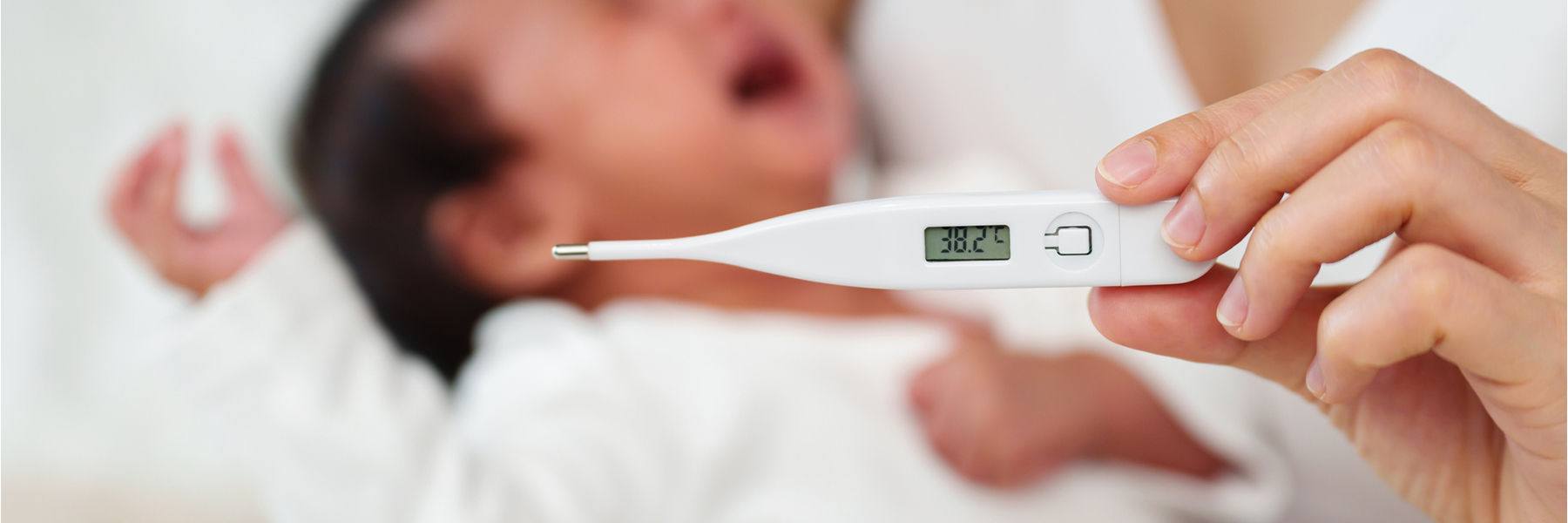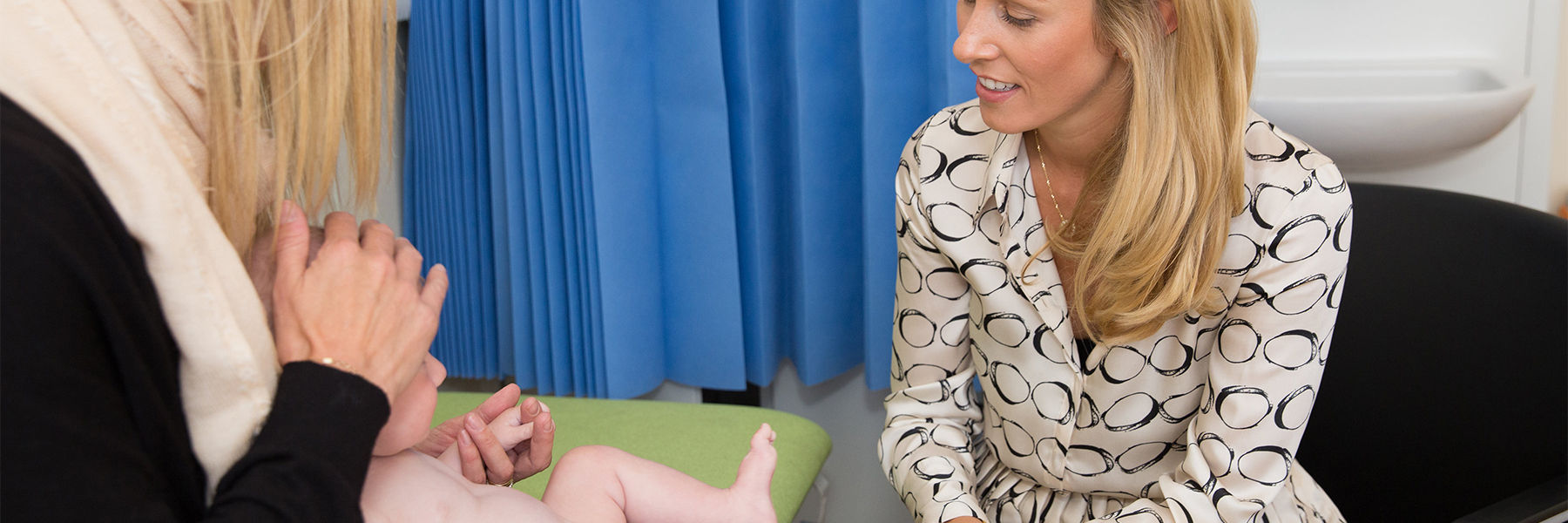Use arrow keys to navigate through the menu items. Use Tab key to navigate through the menu banners.
Baby's First Cold

Baby's First Cold
Dr Anna Cantlay explains what to do when your precious little bundle has a cold
As a GP and mum, I understand how concerning it can be when your little ones are unwell. My 3-month-old baby recently caught his first cold from his big brother, and it was hard to see them both struggling with their symptoms.
Whilst coughs and colds usually get better by themselves, it’s important to know how to look after your baby and when to seek help.
How often do babies get colds?
Colds are minor infections of the nose and throat, and they can be caused by hundreds of different viruses. Young children get coughs and colds often as they are yet to build up immunity to the viruses. You might be surprised to hear that up to eight colds per year is considered normal for a young child! In those first few years the runny noses can feel relentless. Don’t despair – the frequency does decrease as they get older.

Dr Anna in her surgery
What causes a cold?
Coughs and colds are spread through airborne droplets when someone coughs or sneezes, and then someone else inhales the droplets. They can also spread if an infected person touches you or touches a surface that you then touch.
How do you prevent your baby catching a cold?
These are the best ways to help your little ones avoid an infection:
-
Wash your hands and theirs regularly with soap and water.
-
Catch coughs and sneezes in tissues when possible, and quickly bin them.
-
Avoid sharing household items like cups or cutlery.
-
Discourage siblings, family or visitors from kissing your baby on the face.
It’s also a good idea to clean your children’s toys every few days to help prevent the spread of infection. You can either use a disinfectant wipe or washing up liquid on a wet cloth (wait for the toy to dry before returning it to your baby). Pop soft toys in the washing machine with laundry sanitiser, which kills the cold virus, even at low temperatures.
What are baby cold symptoms?
Cold virus symptoms may include:
-
A blocked/and or runny nose
-
A cough
-
Earache (babies and non-verbal young children may pull their ears)
-
Sore throat (this can make babies and young children go off their milk or food)
-
A raised temperature (above 37.5°C)
-
Being fussier or crying more often
-
Being restless at night, waking up often
How to take your baby’s temperature
It’s recommended that you use a digital thermometer placed in your baby’s armpit. This is the best way of taking their temperature as ear probes are often too big for their small ear canals and can give inaccurate readings.
Should my baby see a doctor?
In most cases, common colds and coughs get better within 5-7 days but it can take up to 2 weeks. If the symptoms are mild and your baby is eating, drinking and breathing as normal, you don’t normally need to see a doctor and the virus will get better on its own. However, if your baby is less than 3 months and has cold symptoms or a fever of 38°C or above or is 3-6 months old with a temperature of 39°C or above, it’s important to call your doctor’s surgery or 111. This is so the doctor can make sure other more serious illnesses aren’t present.
Arrange an urgent doctor review if your baby has any of the following symptoms:
-
Difficulty breathing – look for a rapid or irregular breathing rate, flaring of the nostrils, tugging at the windpipe or sucking in under the rib cage (retracting)
-
Wheezing or grunting
-
Skin that is an abnormal colour, such as pale, blue or purple
-
Skin that is mottled (patchy skin with a purple tinge) on their legs, arms or body
-
Difficulty with feeding (less than half their normal feeds for the last few feeds)
-
Reduced wet nappies or a dry nappy for 12 hours or more
-
A cough that has been persistent for 3 weeks or more
Home remedies that can help
It can be upsetting to see your baby struggling or unsettled with a cough or cold, but you can help them feel more comfortable. It’s sensible to have a coughs and colds “toolkit” so you have everything you need in one place should your baby become unwell. Here’s what I have in mine:
-
Nasal saline to help loosen and clear mucous from the nose
-
A nasal aspirator (also known as a snot sucker!)
-
A baby vapour rub, oil or plug
-
A humidifier to use at night to help them sleep
-
Infant paracetamol liquid (from 2 months) or ibuprofen (from 3 months) if they have a fever
It’s normal for babies to lose their appetites when they have a cold but try to ensure they are getting plenty of milk. Other over the counter medication such as decongestants and cough syrups are not recommended in babies.
Should my baby be prescribed antibiotics for a cold?
Antibiotics won’t work against viruses and are used to treat bacterial infections. A doctor may prescribe antibiotics if they are concerned about a bacterial infection after assessing your baby.
A final word…
I hope you now feel more confident about tackling your baby’s first cold. Get washing those hands and catching sneezes in tissues to help prevent the spread of infection. And remember, if you are ever concerned about your baby please speak to your own GP or call the NHS on 111 for urgent advice.
About Dr Anna
Dr Anna Cantlay is a GP in London. Find her on Instagram at doctoranna_gp
Help & Customer service
- Help Centre
- How to shop
- Product recalls
Payment Methodslist with 8 items
- Asda Group of Companies
- Modern Slavery Statement
- Electrical Waste Recycling
- Terms & Conditions
- Customer Review Policy
- Privacy Centre
- Cookie Settings
- Accessibility
© ASDA 2025